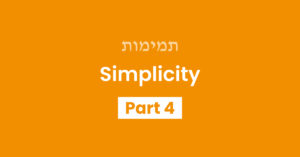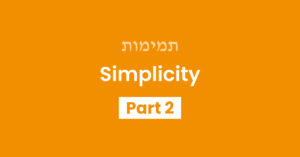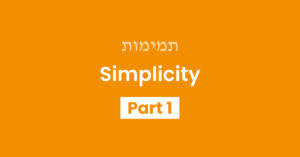So far this month, we have been discussing the middah of Temimus. First, we explained that “Tamim” literally means “simple.” Being “simple” in this context means “simply” doing the right thing and not thinking too hard – not letting our minds come up with excuses to allow us to do wrong behaviors. Just do what you know is right and don’t let yourself think too hard about it.
Next, we discussed another meaning of Temimus, related to the concept of Bitachon. Having temimus means that we do not feel the need to consult with sorcerers or divinators to find out what will happen in the future. Rather, we “simply” trust in Hashem to take care of us, and accept whatever Hashem does.
This week, let’s try to think: What is it that enables us to trust in Hashem with temimus? How can we be expected to simply “let go” and not worry about the future?
It’s All for the Best
One of the key factors that helps us trust in Hashem with confidence is the knowledge that everything Hashem does is for good. As the Gemara says: “Kol Ma D’Avid Rachamana L’Tav Avid – Everything Hashem does is for good.”1
We don’t always understand how everything Hashem does is for good, but looking at the story of Purim can help us appreciate how this is true. The whole Purim story was one big tale of “V’nahafoch Hu” where everything that looked bad ended up flipping into good: Haman built a gallows to hang Mordechai, but Haman ended up being hanged on those very same gallows. Esther was forced to live in the palace of Achashveirosh… but her presence turned out to be good because only from that high position was she was able to save the Jewish people. The 13th of Adar was meant to be a day when the Jewish people would be destroyed, but instead, the 13th of Adar was a day when the Jews defeated their enemies.
The story of Purim teaches us that even when things look bad or the future seems bleak, Hashem is always taking care of us and everything will ultimately be for the best. Knowing that everything Hashem does is for good is what enables us to “simply” trust Hashem with temimus.
Knowing that everything Hashem does is for good is what enables us to “simply” trust Hashem with temimus.
For example, imagine that you are single and have been waiting a very long time to get married. You have met with numerous shadchanim, passed your resume around to friends and family, and asked everyone you can think of to try to help you find a shidduch. But you are still not married.
At this point, you have two options. You can either drive yourself crazy to do everything under the sun possible to track down your bashert, or you can let go and say: “Hashem, I don’t understand why You are making this so difficult for me to get married. But I accept that You must know what you’re doing and I will let go now and leave things up to You.” It’s not easy work at all, and it’s a tough line to swallow. But we are not here on this earth to enjoy an easy life – we are here to develop our emunah and do mitzvos and come closer to Hashem.
Trusting Hashem’s Commandments
Aside from not understanding why Hashem does things in our personal lives, there are many mitzvos which we might not understand: Why do we have to be so careful not to mix milk with meat? Why is it so bad to turn off a lightbulb on Shabbos?
We can do our best to understand the reasons behind these mitzvos, but, ultimately, the true reasons for mitzvos is beyond our human comprehension. At some point, we need to let go and simply accept Hashem’s commandments with Temimus. If we analyze and question every mitzvah and worry about whether or not we think it makes sense, it can lead us to transgress many aveiros and make big mistakes ch”v.
As the Shem Mishmuel2 explains: This was the mistake that Chava made when she ate from the Tree of knowledge. Hashem commanded Adam and Chava not to eat from the tree. But the snake tried to convince Chava otherwise. The snake said: “Hashem didn’t want you to eat from the tree because He knows that if you eat from it, you will become like G-d and know good and evil.”3
Chava should have thought: “Wait a second. I know that Hashem only wants what’s best for us. So if He did not permit us to eat from the tree, then it must be good to avoid the tree, and I shouldn’t eat from it.” But Chava failed. She doubted Hashem’s commandments and thought that maybe this mitzvah was bad. She ate from the tree and introduced the possibility of death to all of humanity forever.
As we can see, Chava’s sin stemmed from a lack of temimus – a hole in her trust that everything Hashem does is for good. If Chava would have had enough temimus, then she would not have questioned Hashem’s ways and she would have “simply” accepted His command not to eat from the tree.
Chava’s sin stemmed from a lack of temimus – a hole in her trust that everything Hashem does is for good.
By contrast, the Jewish people at Har Sinai demonstrated a very high level of temimus.4 When Hashem asked if they would like to accept the Torah, they said “Naaseh V’nishma – we will do and we will listen.”5 They didn’t need to know “why” – they simply accepted Hashem’s decrees upon themselves without questioning.
The root of our Jewish nation and our connection to the Torah stems from a powerful sense of Temimus – accepting Hashem’s commands and trusting that whatever He does is for good.
The root of our Jewish nation and our connection to the Torah stems from a powerful sense of Temimus – accepting Hashem’s commands and trusting that whatever He does is for good.
This week, let’s practice acting with temimus by “simply” trusting that Hashem knows what’s best. No matter what happens to us, we can rest assured that it is meant for our ultimate spiritual benefit, and whatever commandments Hashem asks us to follow are meant for our benefit, as well.
Sources: [1] Brachos 60b; [2] Shem Mishmuel: Emor 670; [3] Bereishis 3:5; [4] [Midrash Shochar Tov: Mizmor 119; [5] Shemos 24:7
Your Challenge
Once a day, while (or before) doing a mitzvah, say: “I don’t fully understand why Hashem wants me to do this mitzvah, but I am sure it’s for a good reason. It must be good for my neshama and good for the world as a whole.”
For example, you can say this when you….
- wash netilas yadayim
- avoid biting your nails on Shabbos
(OR)
When something (seemingly) bad happens to you, say: “I don’t know why this is happening to me, but I am sure Hashem is doing it for a good reason.”
For example, you can say this when you….
- stub your toe
- get disconnected while speaking to someone on the phone
Torah Questions
- What is called “tamim” in Shemos 12:5?
- How does Rashi explain what “tamim” means in the above passuk?
- How many times is the word “Tamim” mentioned in Tehillim Chapter 18?
- Fill in the blank: In Devarim 32:4, Hashem is called a __?__ whose actions are “tamim.”
- How does Rashi explain the meaning of “tamim” in the previous passuk?
- The Shem Mishmuel writes that Aharon HaKohen acted with temimus when he accepted Hashem’s decree without questioning. What is one example of a time when Aharon accepted one of Hashem’s decrees without questioning?
Questions to Ponder
- In the same passuk, the Torah calls Yaakov an “Ish Tam” (simple man) and calls Eisav an “Ish Yodei’ah Tzayid – a man who knows how to hunt.” How do you think these terms are opposites of each other?
- The Torah uses the word “tamim” to describe Iyov, but uses the word “tam” to describe Yaakov. Do you think there is a difference between the meaning of these two words?
- The Torah is called “Temima” as it says “Toras Hashem Temima” (Tehillim 19:8). What do you think it means that the Torah is “Temima”?
- ּThe Yalkut Reuveini says that there are 7 levels of tzaddikim in Gan Eden and the third level is people who are Tamim and do not question Hashems ways. At the head of this level is Elazar ben Aharon Hakohen. Why do you think Elazar was chosen to lead this level more than any other tzaddik in Tanach?




